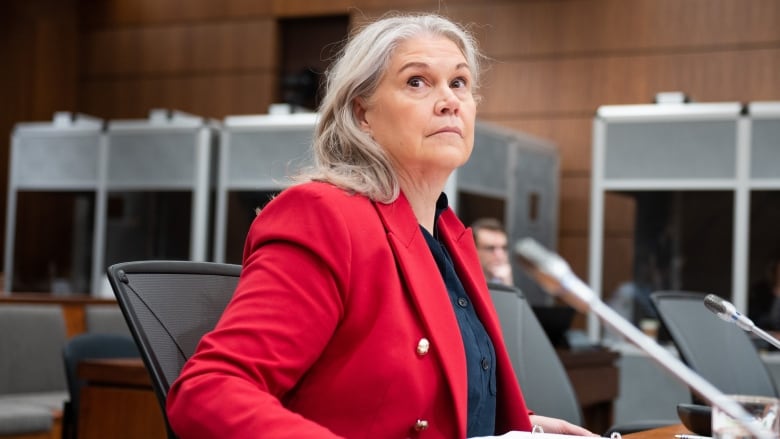The source behind foreign interference leaks 'will be found' and punished, PM's security adviser says
Jody Thomas says security official jeopardized intelligence secrets to leak information, gain ‘notoriety’

The prime minister's top national security adviser says she expects the security official who leaked sensitive information to the media about attempted Chinese interference in Canadian politics — prompting months of controversy over foreign interference in Canadian elections — will be caught and punished.
"The law has been broken. Sources, techniques have been put at risk. Our credibility with Five Eyes allies has been put at risk," Jody Thomas told host Catherine Cullen in an exclusive interview with CBC's The House that will air Saturday.
"There are better ways of doing this," Thomas said during the interview — her first since being named national security adviser. "There are better ways of raising your concerns within a national security agency. There are better ways of trying to bring some light to this topic than risking Canada's national security."
Starting in late 2022, a series of articles appearing in Global News and the Globe and Mail described alleged Chinese foreign interference in Canadian elections. In some cases the reports were based on leaked top-secret intelligence. The Globe and Mail eventually published a piece written by a national security source who provided information to the paper.
The source wrote that they were motivated to speak out because "it had become increasingly clear that no serious action was being considered. Worse still, evidence of senior public officials ignoring interference was beginning to mount."
Thomas has appeared a number of times before a parliamentary committee studying foreign interference in Canadian elections. She told CBC the source was wrong to leak sensitive information to the public.
"It's incredibly disturbing on a number of levels. One, that they would be so unaware of what has been done. That, two, they would risk our national security in order to leak information and gain some notoriety …" she said.
"Three, [that they] leak parts of information that don't tell a complete story, that perhaps looks salacious and scandalous in a headline, but don't tell the complete story of what came before that piece of intelligence that was leaked and what's come after and what the analysis is and what's been done with it."
Asked Thursday whether he felt Canada's credibility as an intelligence partner has been threatened by the leaks, U.S. Ambassador David Cohen said his government remains confident in Canada.
"I will tell you, I can't speak for every Five Eyes country but I can speak for the U.S. and definitively saying that our intelligence relationship with Canada remains strong," he said.
Asked whether the source encouraged a conversation about national security that Canadians needed to have, Thomas said she believes "there's no benefit to leaking. I will never concede there's a benefit."
"There's a benefit to having a conversation and there's a benefit to ensuring that the security agencies are more forthcoming and more forthright with information."
Still, Thomas said Canadians do need to have a discussion about what national security really means, how concerned citizens should be about these reports and what is being done to address those concerns and ensure the security of elections.
The Liberals are embroiled in an extended controversy over their response to allegations of foreign interference. Canada's security agencies have acknowledged that foreign actors like China have sought to influence Canadian elections — but government reviews have said Canada's 2019 and 2021 elections remained free and fair and the results were not changed by any interference.
Opposition parties have been calling on the government to launch a public inquiry into the issue. Conservative Leader Pierre Poilievre has accused the government of staging a cover-up.
Poilievre recently wrote to Intergovernmental Affairs Minister Dominic LeBlanc saying that — after David Johnston resigned as special rapporteur on foreign interference — he would not suggest any names of people who might lead a public inquiry until the government committed to holding one.
Thomas says Chong 'should have been told'
Criticisms of the government's handling of the situation have been particularly ferocious when it comes to a 2021 CSIS intelligence analysis that said Chinese officials may have been targeting the overseas family of a Canadian MP.
That MP turned out to be Michael Chong, now the Conservatives' foreign affairs critic. Chong allegedly was targeted by Beijing in response to his advocacy for the persecuted Uyghur minority.
Chong himself was not informed of the CSIS report until two months ago, when it was reported on in the Globe. In the immediate aftermath, Prime Minister Trudeau said his office never received the document. He was forced to backtrack later in the week and acknowledge it was received but not brought to his attention.
"I will concede that Michael Chong should have been told that, while there was no physical risk to his family, there was interest in his family as a result of his work on the Uyghur motion. I will agree with that," Thomas told Cullen.
Thomas blamed the mishandling of Chong's case on "an insufficient process" but said reforms have been implemented to ensure intelligence information flows more effectively to politicians and officials.
"I think that, on the whole, actionable intelligence is acted upon," she said. "This was more anomalous than it sounds, because we've been talking about foreign interference for quite some time."
Thomas said she believes the national security apparatus failed when it came to advising the government — not when it came to production or dissemination of intelligence.
"It's what we do with information when we read it … It has no value unless it's acted upon," she said. Thomas added that "new governance and new accountability" would help plug gaps where information that pertained to multiple departments may have been left in limbo.




